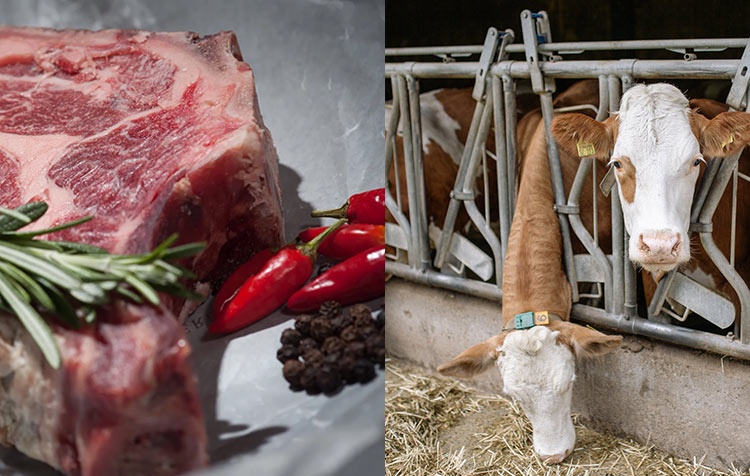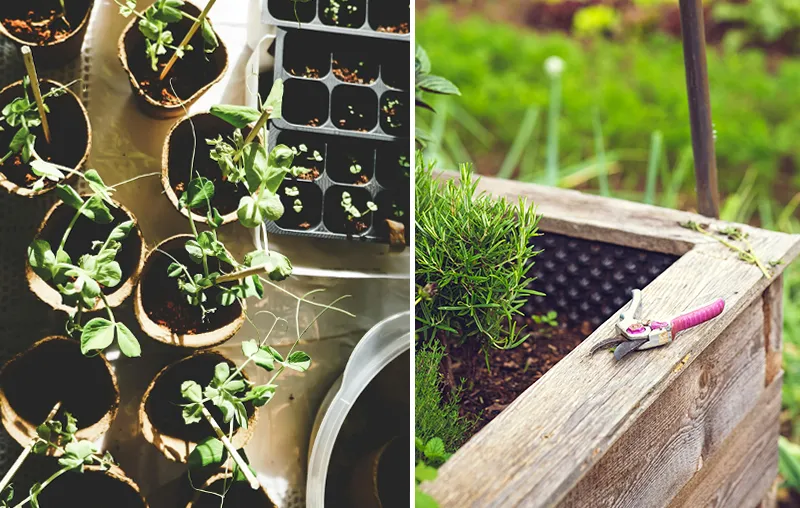Would you like to find out more about euphemism in animal products such as meat, eggs, milk or honey? Then you've come to the right place! Euphemisms are euphemistic, softening descriptions for unpleasant objects or circumstances. They are disguising terms used by the meat, egg and dairy industries and the like to create the greatest possible psychological distance from the animals for whose torture and death we ultimately "voluntarily and gladly" pay money.
In reality, this is a deliberate manipulation and consumer deception that soothes our conscience while we act against our own values (e.g. love, mercy, compassion).
In this article, I would like to introduce you to some euphemistic words and technical terms that are intended to distract us consumers from the suffering caused by animal-based foods. I will also briefly explain what they actually mean. Let's go!
Here is an overview for you in advance:
- Meat
- Processing plant
- Ham
- Leather
- Milk
- Honey
- Sausage
- Bacon
- Artificial insemination
- Dairy cow
- Animal production
- Slaughter
- Human
- Fresh meat
- Schnitzel
- Bycatch
- Ready for slaughter
- Poultry
- Refinement
- Animal Welfare
- Cropping
- Fur
- Adjusted inventories
- Free-range
- Inventory clearance
- Salami
- Species appropriate husbandry
- Goulash
- Wool
- Euthanasia
- Caviar
- Sailor
- Bündnerfleisch
- Kotlett
- Suction softener
- Intensive animal husbandry
- Farrowing pen
- Livestock
- Eggs
- Broiler
Notice: Not all terms are euphemisms in the classic sense - but they all definitely have a euphemistic effect.
1. meat
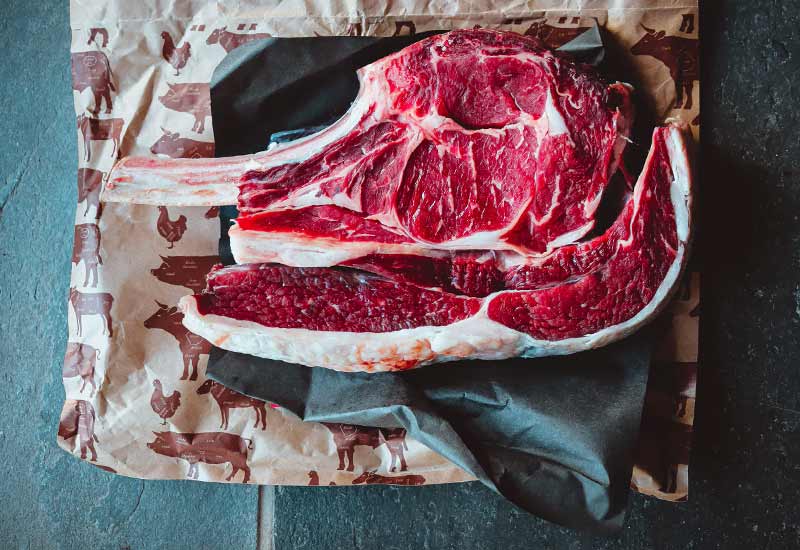
... instead of body part.
We are actually talking about body parts from pigs, cattle and sheep. The term "meat" softens the reality and is so deeply embedded in our vocabulary that we no longer question it.
2. processing plant
... instead of slaughterhouse.
A processing plant can really be anything and in our minds is more reminiscent of a factory where objects are assembled or manufactured - not killed and dismantled. This euphemism therefore disguises the actual circumstances, making consumers feel better.
3. ham
... instead of part of the hind leg.
Whether cooked ham or air-dried and smoked ham - very little about these expressions is reminiscent of what was once alive, sentient animal.
4. leather
... instead of chemically preserved animal skin.
Leather is another euphemism for animal products. Real leather is nothing more than chemically treated, tanned animal skin.
5. milk
... instead of breast milk.
The word "milk" is also one of the euphemistic terms. It sounds much better than if you were still drinking breast milk as an adult. But in the end, it is nothing more than the secretion of the mammary glands of domesticated female animals.
Tip: Why vegans do not drink milk and which plant-based alternatives to cow's milk I will explain in more detail in the linked articles.
6. honey
... instead of sugary excreta products of insects.
Bees produce honey as their own source of nutrition. It is produced when the insects swallow nectar and honeydew and these substances enter their so-called honey bladder. The bee then regurgitates the sap again and again and sucks it up again. The word "bee vomit" would therefore be more appropriate than the pleasant-sounding term "honey".
7. sausage
... chopped up body parts instead of stuffed into intestines.
Certain words make animals tasty - and obscure the cruel background for meat eaters. The word "sausage" is definitely one of them and increases the distance to the origin of the "food", which actually only consists of chopped up and mixed together body parts of animals.
8. bacon
... instead of sliced fat tissue from the pork.
The euphemism "bacon" also makes the consumption of animal products much more pleasant, as it does not remind us of the animal that has been bred and killed for consumption. But in reality, it is just fatty tissue found under the skin of pigs.
9. artificial insemination
... instead of sexual rape.
In humans, the term stands for voluntary insemination, which grants the hope of having a child of one's own. In animal husbandry, however, it is a euphemism for the process of forcibly and involuntarily inseminating a female animal - and therefore for the sexual rape of animals, which happens deliberately, regularly and completely legally so that we humans can drink the mother's milk.
10. milk cow
... instead of cow.
This euphemism simply rests on how the animal benefits man and suggests that the cow exists only for the one purpose.
11. animal production
... instead of the systematic exploitation and killing of animals.
The sub-concept of production suggests that we are dealing with products and not with sentient beings. Products are lifeless, which is why this euphemism in animal husbandry makes it easier to ignore the suffering and murder of animals for our own consumption.
One more thing: Meat production" is also a euphemism and stands for the systematic and mass killing of animals to produce meat products.
12. slaughter
... instead of killing or murder.
The meat industry is desperately trying to avoid terms such as "killing" because it naturally goes against the values we were all brought up with. Even "slaughter" is actually still too extreme, which is why people prefer to use euphemisms such as "cull", "euthanize" or "production process". This soothes our own conscience - and somewhat curbs the expected reflexive tendency to become vegetarian or vegan.
13. human
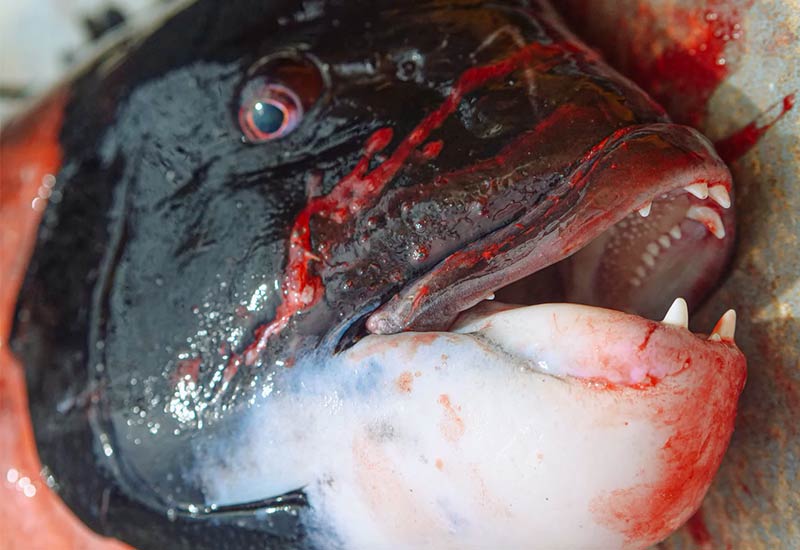
... instead of brutal.
Normally, there is no need to mention whether something is humane (i.e. humane, merciful, without harshness and with forbearance). However, to be on the safe side, the animal industry speaks of "Humane Battles"when she speaks of the killing of "farm animals" in the gas chamber, in an electric bath or by having their throats cut.
14. fresh meat
... instead of unpreserved body parts of dead animals.
Fresh food is nutritious and delicious. However, fresh meat is the muscle tissue of recently killed animals. And fresh fish is actually the exact opposite, namely a rotten body part from a fish - which is why it smells accordingly.
15. cutlet
... flattened, pressed muscle fibers from the hind leg or back of animals.
The term "schnitzel" is also a euphemism for animal products that softens the unpleasant feeling of eating body parts of a sentient being.
16. bycatch
... instead of unintentionally caught, suffering and killed animals.
In the fishing industry, for example, sharks, dolphins, sea turtles, whales, seals or birds usually end up in the nets, although other animals should actually be caught. These animals, which often die in the nets, are euphemistically dismissed as bycatch and imply that it is okay to kill animals for human consumption.
17. slaughter maturity
... instead of fat enough to be killed.
'Ripeness to slaughter' is a rather economic term in the most efficient meat industry possible, which is a euphemism for the fact that a cow, pig or other 'farm animal' is large and heavy enough to be killed and cut up into many individual parts. The word part "maturity" puts the animal on the same level as plants and makes the killing appear to be a natural state.
18. poultry
... instead of chicken.
Poultry are bird species that are bred as farm animals or pets - such as chickens. The word generalizes and also increases the distance to the individual.
19. refinement
... instead of controlled spoilage of processed animal breast milk.
People in the animal industry like to talk about refining their products when it comes to processing them. This sounds much healthier, tastier and of higher quality - but it does not make the process any more efficient. For example, the 25 kilograms of grain required to produce one kilogram of beef is referred to as processing loss.₁
20. animal welfare
... instead of minimally less animal suffering.
Another euphemism for animal husbandry is the term "animal welfare". A corresponding label and the words "welfare" and "animal" together are supposed to give us a better conscience - but basically nothing changes for the animal itself. In reality, there can be no talk of animal welfare if the animals are kept in captivity, exploited and killed - at most "a little less". Cruelty to animals„.
21. docking
... instead of amputating body parts.
To prevent stressed pigs and chickens in factory farming from injuring themselves, for example, their curly tails, teeth and beaks are shortened.
22. fur
... hairy coat of an animal.
At Fur most of us understand the term "animal welfare" to mean an item of clothing rather than an animal's body part. The term creates a safe distance from the thought of its former animal owner and removes the psychological, moral hurdle of buying such products.
Tip: How you Recognize real fur and how to avoid it, you can find out in a separate article.
23 Adjusted inventories
... instead of targeted killing of animals intended by humans.
Hunters in particular like to talk about "adapted populations" or "taking from nature" when hunting and killing certain animal species.
24. free range
... instead of keeping animals not exclusively indoors.
The words "free" and "country" suggest that chickens are doing well and that "free-range eggs" can be consumed with a clear conscience. However, free-range chickens are also overbred, have to share a square meter with nine other chickens and are killed in the same slaughterhouse as caged chickens.₂
25. inventory clearance
... instead of killing an entire herd due to external influences.
If a disease breaks out in a barn, all the animals may be killed at the same time - for example by gassing. However, the term "depopulation" is more reminiscent of a retail sale.
26. salami
... instead of raw dried pork with mold coating.
Salami is simply dried muscle tissue from animals. Another euphemism that draws a large veil around the background to the production of meat products.
27. species-appropriate husbandry
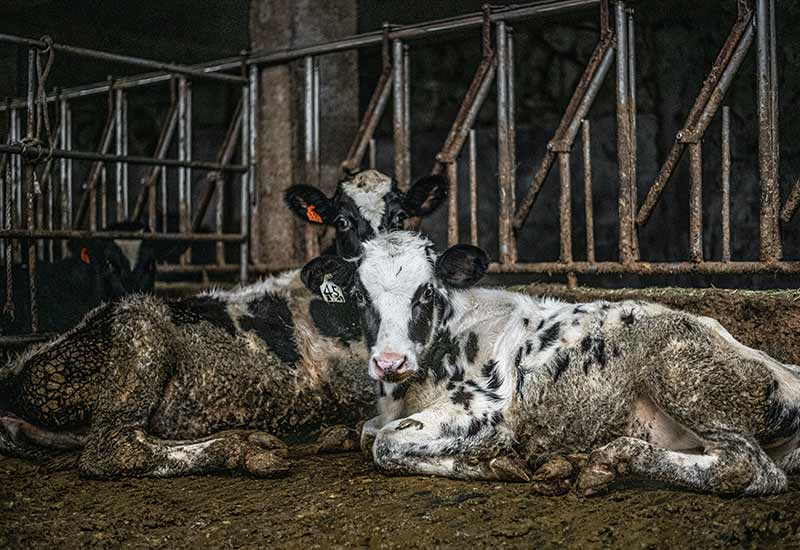
... instead of animals kept (and bred) in captivity.
Keeping cows, pigs or chickens on a few square meters with thousands of other animals is not species-appropriate. Reducing the number of animals to 150 is also not species-appropriate. The animals were only bred for human consumption and are kept in captivity - that cannot be fair.
28. goulash
... instead of cadaver muscle cubes.
Beef goulash is nothing more than cubes of meat from older, killed animals. However, the term "goulash" makes it easier to continue paying for the torture and killing of animals.
29. wool
... instead of soft hairs of the fur of sheep.
Wool sounds much cuddlier and more harmless than (often violently) severed animal hair, don't you think? Another euphemism that downgrades animals from an independent individual with feelings to an unfeeling commodity.
30. euthanasia
... instead of beating weak, sick animals against a wall.
By euthanasia, we actually mean the peaceful death of a suffering animal in its own interest. Instead, however, euthanasia in factory farming is aimed at the economic interests of the farmer, who slams weak, injured or sick animals against the wall until they are dead. Unfortunately, this is a common practice.
31. caviar
... instead of mature eggs of female fish and other marine animals.
It is actually roe from various sturgeons. But "roe" is also a euphemism for fish eggs - and caviar is nothing else: cleaned and salted fish eggs.
32. sailor
... instead of an animal not sufficiently stunned during killing and dismemberment.
Extremely cynical is the euphemism "sailor", which is common in the slaughter industry and describes, for example, pigs and chickens that wake up in the scalding bath while their body parts are being torn off alive.
33. Bündnerfleisch
... instead of dried cadaver muscle.
Bündnerfleisch is a culinary specialty from Switzerland. It is cured meat from the thigh muscles of cattle, with tendons and fat removed.
34. cotlett
... instead of cadaver bone with cadaver muscle.
Slices made from the ribs of pigs, calves or lambs, complete with bones, have also found a euphemistic alternative term in "excrement", which masks and hides the violence against animals.
35. suction softener
In addition to the usual Tools in factory farming is the so-called suckling weaner. This is a spiky nose ring that is used to discourage small calves from drinking their mothers' milk, as this is bought and drunk by humans.
36. intensive animal husbandry
... instead of factory farming.
Also the concept of Factory farming now has a very bad image. Accordingly, the euphemism of "intensive animal husbandry" or "modern animal husbandry" is often used. This at least makes it sound as if the welfare of the animals is important and the most modern technologies are used.
Tip: What you can do personally against factory farmingyou can find out in the linked article.
37. farrowing pen
... instead of tight metal stirrups used to secure pregnant sows.
In the first few weeks after giving birth, sows suckle their piglets. In factory farming, this takes place in the so-called "farrowing pens". A euphemism that describes the environment in which the mother sows are basically immobilized under metal bars.
38. livestock
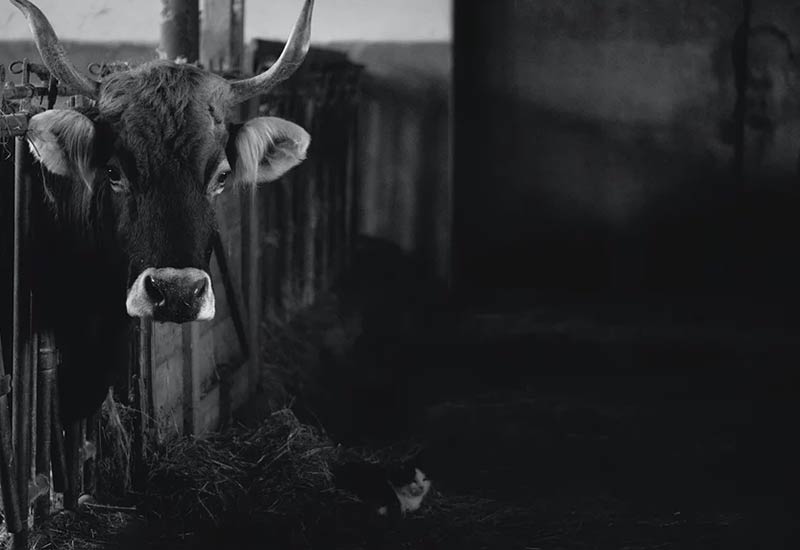
... instead of cow, pig or chicken.
This euphemism for animal husbandry also gives the impression that human use is part of the nature of animals. This creates a differentiation between wild/domestic animals (which must be protected) and farm animals (which may be killed) - even though there is no moral difference.
Good to know: Such a judgmental distinction between different breeds of animals is called a Speciesism. Ultimately, it is also based on the benefits of the individual for people.
39. eggs
... instead of menstrual product of a chicken.
An egg must pass through a hen's ovary, oviduct and vagina before it is laid by the hen. The word egg may not be a classic euphemism, but it glosses over what it actually is: the hen's period. For many Vegan is in any case the decisive reason to give up eggs.
Tip: Vegetable egg alternatives you will learn in the linked article.
40. broiler
... instead of fried chicken.
The term broiler refers to fried chicken. And since this is also a euphemism of the meat industry, it is more precisely a fattened and roasted chicken.
Know the euphemism of animal products and face reality
Changing habits is difficult - But if you really want to live in harmony with your own values and avoid inner conflicts and remorse (more under cognitive dissonance) should not regard animals as objects, but as sentient individuals who, like us, feel joy and pain and have daughters, sons and parents.
We call an animal lying in the street a carcass - we call an animal on a plate dinner. Try to see mitigating, obfuscating, euphemizing and sometimes trivializing terms for what they really are. The decisive advantage of this, live veganIn my opinion, you no longer have to sugarcoat anything because you are finally acting in complete harmony with your own values.
Finally, I would like to present the Dominion film which is guaranteed to open your eyes to the suffering of animals caused by our consumer habits.
Do you have any questions, tips or other euphemisms that the industry uses to disguise the background to the production of meat, eggs, milk or cheese? Then I look forward to your comment.
Stay animal-friendly,

PS.: In our language there are also some Sayings with animal involvementwhich are not animal-friendly at all. In the corresponding article I show you some examples.
References:
₁ Things explained - In a nutshell: Meat - The most delicious evil in the world, YouTube, 24.01.2019, Web, 07.05.2020 at 10:50 a.m., in: http://y2u.be/y6f3dwxexZM.
₂ Lisa Mainz; PETA Deutschland e.V.: 4 reasons why free-range eggs cause suffering (as of 15.03.2022), available at https://www.peta.de/themen/freilandhaltung-huehner-eier. [07.04.2022].

